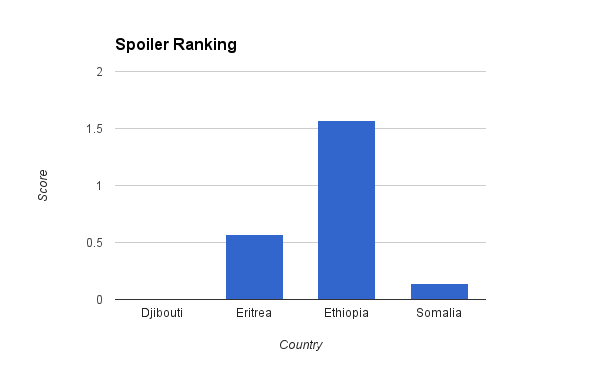Eritrea is often characterized in media and academic literature as a “spoiler”, particularly in the Horn of Africa region. It is in part, based on this characterization, that Eritrea has earned the title “the North Korea of Africa”. How accurate is this characterization? Is Eritrea truly the regional spoiler in the Horn of Africa?
Some may ask if this characterization is relevant to reporting and understanding the region. A seminar conducted at the London School of Economics (LSE) bringing together members of government, academics, and others concluded, “[these labels] affect the local political marketplace, influence analysis and access, and can lead to badly calibrated or polarized responses.” ((The ‘Spoiler’ Concept, Conflict and Politics: who ’spoils’ what, for whom?; Seminar held March 2010; London School of Economics)) (Emphasis added) Thus, if we are truly to understand the region and its politics, we must first use proper labels.
What is the Horn of Africa?
The Horn of Africa is often described as the eastern portion of Africa resembling a “horn”, thus leading to its name. The countries that make up the Horn typically include (in alphabetical order): Djibouti, Eritrea, Ethiopia, and Somalia. These are the countries reviewed here. In some descriptions, a “greater” or “outer” Horn of Africa includes: Sudan, South Sudan, Uganda, and Kenya. The “core” Horn of Africa countries are reviewed here for a more direct comparison with respect to Eritrea.
How do you Identify a Spoiler?
There is no clear definition of a “spoiler” or “regional spoiler”. Of the many definitions a combination resulting from the German Institute for International and Security Affairs ((https://www.swp-berlin.org/fileadmin/contents/products/projekt_papiere/GermanForeignSecurityPolicy_SWP_GMF_2013.pdf)) and papers resulting from the LSE seminar described above ((The ‘Spoiler’ Concept, Conflict and Politics: who ’spoils’ what, for whom?; Seminar held March 2010; London School of Economics)) lead to several important factors. Although other analysis may weight each of these factors, in this analysis they have been given equal weight while each factor is described such that the quantity of instances is recorded.
In general, the key aspects reviewed below are based on breaches of international norms and domestic violence that may affect the region:
- Active military adventure (non-peacekeeping; legitimated)
- Active military occupation (breach of international sovereignty)
- Support or harboring of militants (non-state armed groups; including terrorists)
- Commit acts of genocide
- Use weapons of mass destruction
- During war – targeting of civilians
- Current domestic armed conflicts
It is necessary for this analysis that as many objective characteristics be identified to reduce both criticism as subjective analysis but also to be reproducible. Of course, this brief analysis only represents a brief snapshot in time (September 2016).
What is the Verdict?

Based on the chart above it is clear that the greatest regional spoiler is Ethiopia. Ethiopia’s regional spoiler score is nearly double that of the nearest state, Eritrea. This seems to contradict most literature – how did we get here?
The characteristics of regional spoilers are primarily focusing on violence (including that associated with militants). Because these factors generally focus on violence, Djibouti large escapes identification. Djibouti hosts many military bases and does not attempt to secure its sovereignty militarily. Somalia meanwhile is largely unable to engage in many of these acts based on the domestic siege situation. As a consequence, the most difficult factor associated with Somalia, is the domestic violence which may affect the rest of the region. This is certainly true as Al Shabab (the Somali militant group) has attacked targets outside of Somalia.
Meanwhile, Eritrea and Ethiopia do support and shelter the militant groups opposing the other. Ethiopia has supported a fractious group of militants against Eritrea, primarily focused on creating an ethnically fractured Eritrea. Meanwhile, Eritrea has sheltered militants attempting to loosen the Ethiopian government’s hold on governance. Finally, unlike any other state in the region, Ethiopia has maintained a decades long occupation of Eritrean territory, flouting treaties and international norms of state behavior. Each of these acts has led to a higher spoiler score, however, due to the magnitude and scale of Ethiopia’s behavior – it has earned the title of greatest regional spoiler.
Hopefully, this brief analysis can be the beginning of a more rational discussion about affairs in the Horn of Africa region. By discarding the unrealistic characterization of Eritrea, a new focus can be shed on dispelling the spoiling behavior of the Horn of Africa’s regional spoiler.
Be First to Comment